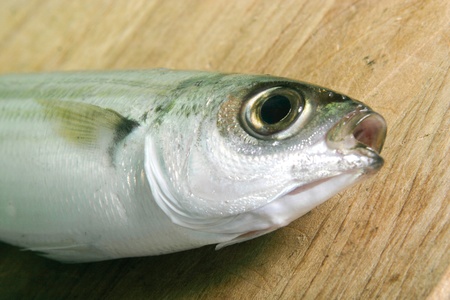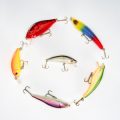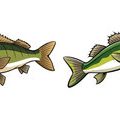Introduction to Louisiana Fishing Laws
Fishing in Louisiana is more than just a favorite family pastime—it’s a way of life for many locals and visitors alike. With its rich bayous, winding rivers, and vibrant Gulf Coast, the state offers some of the most diverse fishing experiences in the country. However, before heading out with your rods and reels, it’s important to understand Louisiana’s fishing laws, especially when it comes to license requirements. These regulations aren’t just red tape—they play a crucial role in protecting our precious fish populations and keeping waterways healthy for future generations. By requiring fishing licenses, Louisiana ensures that anglers contribute to conservation efforts, habitat restoration, and ongoing research. Whether you’re planning a relaxing day at your favorite freshwater lake or an exciting saltwater adventure along the coast, knowing the rules helps everyone enjoy a sustainable outdoor experience. In this article, we’ll break down why fishing licenses matter and how these local laws benefit both the environment and our communities.
2. Understanding Freshwater vs. Saltwater Licenses
If you’re planning a family fishing trip in Louisiana, one of the first things you’ll hear about is the difference between freshwater and saltwater fishing licenses. It might sound confusing at first, but once you know what separates these two license types—and where you’ll need each—it becomes much easier to plan your adventure.
Freshwater licenses are required if you’re casting your line in rivers, lakes, reservoirs, or bayous that are considered inland waters. Think about taking the kids out to the scenic Lake Bistineau or a lazy afternoon at Cane River Lake—these spots would all need a freshwater license.
Saltwater licenses, on the other hand, are for fishing in coastal areas where the water mixes with the Gulf of Mexico. This includes places like Grand Isle, Venice, and Cocodrie—those dreamy spots where you can catch redfish, speckled trout, or even try for flounder along the coast.
When Do You Need Each License?
Here’s a quick breakdown to help you figure out which license you’ll need for your next Louisiana fishing outing:
| Location/Water Type | License Needed | Example Spots |
|---|---|---|
| Inland Lakes & Rivers | Freshwater License | Toledo Bend Reservoir, Red River, Lake D’Arbonne |
| Coastal Waters & Estuaries | Saltwater License (plus Freshwater License if fishing inland/salt boundary) | Lake Pontchartrain (south of saltwater line), Barataria Bay, Grand Isle beaches |
| Mixed/Boundary Areas | Both Licenses May Be Required* | Mouth of Mississippi River, Lower Calcasieu River |
*Louisiana has a designated “saltwater line” that marks where saltwater licenses become necessary. If you’re not sure whether your favorite spot requires a freshwater or saltwater license—or both—it’s always best to check the Louisiana Department of Wildlife and Fisheries website.
This distinction is really important for families who want to make sure everyone’s having fun—and following the rules! Whether you’re teaching your kids how to bait a hook in a quiet pond or heading down to the gulf for bigger catches, knowing which license covers your plans makes everything smoother and stress-free.
![]()
3. Who Needs a Fishing License?
If you’re planning a fishing trip in Louisiana, knowing who needs a fishing license is essential before you cast that first line. Let’s break down the requirements for residents, non-residents, kids, seniors, and military members, using some everyday examples to make things crystal clear.
Louisiana Residents
Most Louisiana residents age 18 and older need either a freshwater or saltwater license (or both) depending on where they plan to fish. For example, if you’re living in Baton Rouge and want to take your family out to Lake Pontchartrain for the weekend, anyone 18 or over must have the appropriate license. However, if your teen is only 16, they can tag along and fish without needing their own license.
Non-Residents
Visiting Louisiana from another state? Non-residents also need a fishing license starting at age 16. Imagine your cousin from Texas comes to visit and you decide to try your luck catching redfish in the Gulf—your cousin will need to purchase a non-resident license before joining you on the boat.
Kids
Good news for families: Children under 16 are exempt from needing a fishing license in Louisiana. So if you’re planning a father-daughter outing or taking your grandkids out for their first catch, they can fish freely while adults handle the paperwork.
Seniors
Louisiana residents who are 60 years old or older and were born before June 1, 1940, don’t need a standard fishing license—they qualify for special exemptions. For those born after this date, there’s a discounted lifetime license available. Picture your retired neighbor who’s always out on the bayou; if he’s over 60 and fits these criteria, he might not need a regular license at all!
Military Members
Active-duty military personnel stationed in Louisiana enjoy resident licensing rates regardless of where they’re originally from. For example, if an Air Force member from Ohio is based at Barksdale Air Force Base, she’ll pay the same price as any Louisiana resident. Plus, Louisiana offers certain exemptions for disabled veterans and active duty members on leave—so it’s worth checking eligibility before heading out.
Understanding these rules helps ensure everyone has a smooth experience enjoying Louisiana’s rich fishing traditions—whether you’re introducing your kids to crabbing in the marshes or hosting friends from out of state for a weekend adventure.
4. Types of Louisiana Fishing Licenses Available
When planning your next Louisiana fishing adventure with the family, it’s important to choose the right license that fits everyone’s needs. Louisiana offers several types of fishing licenses, each tailored for different situations—whether you’re casting lines for just a weekend or gearing up for an entire season of freshwater and saltwater fun. Let’s break down the main options so you can find the perfect match for your next outing.
Annual Licenses
If your family loves regular fishing trips throughout the year, an annual license is often the most convenient and cost-effective option. These licenses are valid for a full 365 days from the date of purchase and cover either freshwater, saltwater, or both if you opt for a combo package. With an annual license, there’s no need to worry about renewing before every trip—just grab your gear and go!
Temporary (Short-Term) Licenses
For out-of-state visitors or families who only fish occasionally, temporary licenses are a great choice. Louisiana offers one-day and five-day licenses, allowing flexibility if you’re in town for a short vacation or trying out fishing for the first time. These are perfect for spontaneous family adventures without long-term commitment.
Combo Packages
Combo packages combine freshwater and saltwater privileges into one convenient license. This is especially handy for families who want to experience both bayou bass fishing and saltwater excursions along the Gulf Coast in a single trip. Combo licenses often offer savings compared to buying separate permits.
Louisiana Fishing License Options at a Glance
| License Type | Who It’s For | Duration | Best For |
|---|---|---|---|
| Annual Freshwater | Residents/Non-residents | 365 days | Frequent inland fishing trips |
| Annual Saltwater | Residents/Non-residents (with basic) | 365 days | Regular Gulf Coast outings |
| Combo Annual Package | Residents/Non-residents | 365 days | Families wanting both experiences |
| 1-Day Temporary | Mainly non-residents/visitors | 24 hours | Short trips, spontaneous plans |
| 5-Day Temporary | Mainly non-residents/visitors | 5 consecutive days | Extended vacations, testing waters |
Tips for Picking the Best Fit for Your Family Adventures:
- Assess how often you plan to fish: If you’ll be casting lines more than twice a year, an annual or combo package can save money and hassle.
- Mix up locations: Planning both freshwater and saltwater trips? The combo package keeps things simple.
- Simplify group outings: For large families or groups with varying interests, mix-and-match licenses so everyone gets what they need—kids may qualify for reduced rates too!
- If you have guests joining: Temporary licenses are quick to obtain online or at local retailers, making them perfect for visiting friends and relatives.
- Stay legal: Always double-check age requirements—children under 16 typically don’t need a license but adults do.
Selecting the right Louisiana fishing license ensures your family enjoys stress-free angling while staying on the right side of local regulations—making those outdoor memories even sweeter!
5. How to Get Your Louisiana Fishing License
Getting your Louisiana fishing license is easier than ever, whether you’re planning a spontaneous family trip to the bayou or mapping out a weekend at the Gulf Coast. Here’s a step-by-step guide to securing your freshwater or saltwater license, with some local tips for a hassle-free experience.
Step 1: Choose Your Method
Online Purchase
This is hands-down the most convenient way, especially if you’re juggling kids and gear. Visit the Louisiana Department of Wildlife and Fisheries website. The process is straightforward—create an account, select your license type (freshwater, saltwater, or combo), fill in your details, and pay with a credit card. You’ll get a digital copy immediately, which you can print or keep handy on your phone.
In-Store Purchase
If you prefer that classic face-to-face service or need advice on local fishing spots, swing by any major sporting goods store, bait shop, or even some grocery stores across Louisiana. Look for the “Fishing License Sold Here” sign. Don’t forget to bring your driver’s license or ID—they’ll need it to process your application.
Using the State’s Mobile App
Tech-savvy families will love the LDWF mobile app. Download it before you leave home—just search “LDWF” in your app store. You can purchase licenses, store them digitally (no more digging through bags!), and access regulations all in one place.
Step 2: Know What You Need
Double-check if you need a resident or non-resident license—there’s a price difference! And remember, kids under 16 fish free. If you plan to fish both fresh and salt water, consider getting the combo license for convenience and savings.
Step 3: Local Tips for Smooth Sailing
- If fishing as a group, nominate one person to handle everyone’s licenses online—it saves time and ensures no one gets left behind.
- Always have a backup (printed or screenshot) of your license when out on the water—cell coverage can be spotty in remote areas.
- If you have questions about which license fits your adventure, don’t hesitate to ask local shop owners; they know their stuff and love sharing tips with families!
With these easy steps, you’ll be ready to cast your line and make memories together in Louisiana’s beautiful outdoors.
6. Fishing Regulations Every Angler Should Know
If you’re planning to cast a line in Louisiana, understanding the state’s fishing regulations is absolutely essential—whether you’re heading to the bayous with your kids or joining friends for a Gulf Coast adventure. These rules are designed not only to protect fish populations but also to make sure our favorite fishing spots stay healthy and vibrant for future generations.
Key Rules You Can’t Skip
First things first: always have your license on hand, whether it’s freshwater or saltwater. Conservation officers regularly check anglers, and being caught without a valid license can lead to fines. Also, double-check the type of water you’re fishing in; certain areas require both freshwater and saltwater licenses.
Catch Limits and Size Requirements
Louisiana sets daily bag limits and size restrictions for many species—like bass, redfish, speckled trout, and catfish—to prevent overfishing. For example, there’s a limit on how many red drum (redfish) you can keep per day, and only one may be over 27 inches. Always measure your catch before tossing it in the cooler! When fishing with kids, turning these checks into a game is a fun way to teach them about respecting nature.
Special Areas and Protected Zones
The state also designates certain regions as protected or restricted waters. Some lakes, wildlife management areas, or coastal zones may have seasonal closures or specific gear restrictions—like banning nets or setting catch-and-release-only rules. Before you go, check the latest maps and regulations from the Louisiana Department of Wildlife and Fisheries.
Conservation Tips for Family Adventures
To help preserve Louisiana’s unique fisheries, practice catch-and-release whenever possible—especially for trophy-sized fish or species under pressure. Use barbless hooks for easy release, handle fish gently with wet hands, and avoid disturbing sensitive habitats like marsh grasses. Teaching these habits to your children not only protects wildlife but turns every outing into an unforgettable learning experience.
By following these key regulations and conservation tips, we can all do our part to keep Louisiana’s waterways teeming with life—and ensure that family fishing trips remain a cherished tradition for years to come.
7. Family Fishing Day: Experiencing Louisiana Together
There’s nothing quite like gathering your family for a fishing adventure in the heart of Louisiana. Whether you’re casting lines along cypress-lined bayous or feeling the salty breeze from the Gulf, family fishing days are about more than just the catch—they’re about creating memories that last a lifetime. As you plan your outing, remember that understanding Louisiana’s fishing laws is key to keeping your experience safe and hassle-free. Make sure everyone who needs a license—adults and older kids—has the right one, whether you’re heading for freshwater catfish or saltwater redfish.
Firsthand Stories: Our Louisiana Fishing Tradition
When our family tried fishing together for the first time at Lake Pontchartrain, we made a checklist: licenses, sunblock, snacks, and plenty of patience. We laughed as Grandpa tried to teach us how to bait shrimp for speckled trout, and we cheered when my daughter reeled in her very first fish. The moment was pure joy—and because we’d taken care of our licenses ahead of time, there were no worries about unexpected interruptions.
Tips for a Fun and Safe Trip
- Double-Check Your Licenses: Before you leave home, confirm which type each adult needs—freshwater or saltwater—and keep them handy (paper or digital copies work).
- Pack Essentials: Bring hats, life jackets for little ones, water bottles, and a first-aid kit.
- Teach Respect: Show kids how to follow local fishing rules and practice catch-and-release when appropriate.
- Choose the Right Spot: Research kid-friendly piers or parks with easy access and good amenities.
Making Every Cast Count
The beauty of fishing in Louisiana is sharing laughter as you wait for a bite, swapping stories with locals on the dock, and savoring simple meals together at sunset. By respecting Louisiana’s fishing laws and being prepared, your family can focus on what really matters—connecting with each other and discovering the wonders of this unique outdoorsy state. So grab your gear, check those licenses, and set out for a day you’ll all remember!


